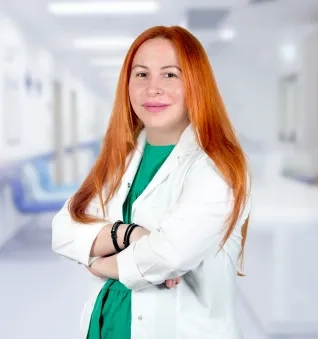Alo Yeditepe
Alo Yeditepe
What is Autism?
Autism is the most common among a group of disorders that are defined as "pervasive developmental disorders" and that occur with the deterioration of the child's development from infancy. Autism is a disorder that the earlier it is recognized and appropriately managed, the better the result.
The first signs of autism appear in infancy and are as follows;
- Babies do not make mutual eye contact
- Calm and quiet babies who have little interest in the environment.
- Social laughter does not develop.
- They do not imitate.
- They are delayed in making speech-like sounds.
In some cases, while the development is normal in the first infancy, it is seen that the skills gained after one year are lost. Vocabulary and mutual communication gradually decrease. In addition to language development, motor development is also delayed in a group of autistic children; They sit late, they walk late, and; the problem may be limited only to language development and mutual social communication skills in another group.
If you observe more than one of the following symptoms in your children, do not immediately assume that they are autistic, but apply to the Child and Adolescent Psychiatry Department with your child and request an evaluation.
- Children may experience delays and retardation in speech and language development, and they may have problems expressing their emotions.
- They are indifferent to games played with their peers or toys and tend to be on their own.
- They exhibit limited stereotypical and repetitive behaviors. (Sometimes they move their hands like flapping wings, walk on tiptoe, and turn around themselves.)
- They do not use body language appropriately. For example, they may not be able to point at the object they want with their fingers.
- They do not look eye to eye, often avert their eyes when eye to eye, or rarely make eye contact.
- They may ignore it, even pretend not to hear when called by their name.
- They persistently mess with some parts of objects, probe, rotate, and smell them, and exhibit repetitive behavior.
- They react when there is a change in clothing, food, etc.
- They may have a narrowed area of interest. For example, they may be fascinated by television commercials or certain pieces of music.
Causes of Autism Spectrum Disorder
Autism spectrum disorder is a neurodevelopmental disorder in which symptoms usually appear in the first three years of life, defined mainly by certain deficits in the development of one's social interaction skills. Although autism is thought to be caused by some nervous system problems that affect the normal function of the brain, the reasons for its occurrence have not become halal. The consensus is that genetic predisposition plays an important role and that the child's upbringing has no effect on the emergence of autism. But what genes cause autism and whether environmental factors play any role remains unclear. Autism spectrum disorder can be found in every country, society, and family type.
Current studies reveal that the incidence of autism in society is higher than the data obtained in the past. In recent studies, this frequency is 1.7 percent, about 1 in every 59 children. It is 4 times more common in boys than in girls.
What are the Symptoms of Autism Spectrum Disorder?
From the first days of life, the baby begins to interact with the environment to a certain extent, and over time, this interaction develops and diversifies. The baby begins to react to the face and voices of those around them, to show interest, and to recognize those in their family. They may show their feelings such as pleasure or pain with their facial expressions. They can go from spelling at around 1 year old to saying simple words such as parents, showing the object they want to acquire with their finger, or looking at the object shown with their finger. They may start to form simple sentences consisting of a small number of words around the age of 2, play games with those around them, and exhibit behaviors that imitate those around them. Although these developments do not have to occur at the same level and time in every child, parents may observe some "non-normal" delays in these developmental processes.
Specific symptoms that may indicate autism spectrum disorder:
● Not making eye contact or rarely making eye contact with others.
● Not reacting when called and pretending not to hear.
● Being indifferent to games played with peers or toys or not knowing how to play.
● Delays and retardation in speech and language development, problems in expressing emotions.
● Performing repetitive unusual physical movements such as flapping or swinging their hands.
● Repeating certain words or sounds continuously, regardless of the situation.
● Keeping eyes fixed on a certain point, focusing on the often-unfocused points of faces and objects for a long time.
● Doing repetitive behaviors such as constantly rotating or lining up things and objects.
● Being able to overreact to innovations in daily life and to resist excessive disruption of daily routine.
● Overreacting or not at all to certain sensory stimuli such as sound, smell, and touch.
If you observe such developmental delays and symptoms in your child, you should immediately consult a specialist. Not every developmental delay or every "abnormal" behavior has to point to autism or any other developmental disorder. However, the symptoms observed in development may also depend on other neurological, physiological, mental, or environmental factors than autism. However, if you think that the symptoms in the above-mentioned areas affect your child's mental and physical development and social communication, it is very important to consult a child health specialist.
How to Diagnose Autism Spectrum Disorder?
It should be noted that autism spectrum disorder can be seen at different levels and types in each child. In other words, your child may only have symptoms in some of these areas, but not in others. Children diagnosed with "autism spectrum disorder" may show different skill levels in different areas. Therefore, autism is defined as a spectrum disorder.
It should be determined in which areas the child has more or fewer problems throughout this spectrum and in which areas it should be focused on. Early diagnosis of autism spectrum disorder is critical. Although there is no definitive treatment for autism, very positive developments in skills in these areas can be achieved with an intensive study and treatment process in the areas where the problem is observed.
How to Treat Autism Spectrum Disorder?
The main purpose of treatment is to ensure that the child acquires development and communication skills appropriate for their age. Accordingly, areas of delay or retardation in the development of the child should be identified without wasting time, and special education programs, language, and speech therapies focused on developing both verbal and action-based skills should be initiated.
A special educational program should be created for each child focused on the child's level in different areas and types of therapy based on sensory, mental, or physical studies should be applied. At this point, the family should also be informed about communicating with the child correctly. In addition to these types of therapy, it should also be determined whether a drug treatment will be necessary.
Due to the nature of autism spectrum disorder, which mainly affects social communication negatively, these children may have difficulty communicating with their peers. One of the important decisions here is how to start or continue schooling according to the age of the child.
Programs such as inclusive education are especially beneficial for the continuation of social development and the child's access to the right to basic education. However, it is also necessary to consider the situations that may cause stress and psychological damage that they may encounter in their relationship with their peers and in academic life. Such an education decision should be made as a result of the cooperation between parents, child health experts, and the school.
This content was prepared by Yeditepe University Hospitals Medical Editorial Board.
”
See Also
- What is Autism Spectrum Disorder?
- What is Mythomania (Pathological Lying Disorder)? What Causes Mythomania?
- What are the symptoms of a Panic Attack? How to Overcome a Panic Attack?
- What Does Narcissist Mean? Narcissistic Personality Disorder
- What is Peer Bullying?
- Puberty
- What Causes Sleep Problems in Babies?
- Families with Children Who Have Autism Should First Accept the Situation
- Experts Warn Students Before the Exam!
- Tips for Choosing a Babysitter
- How to Approach a Child in Adolescence?
- Has Your Child Adapted to School?
- Let the Bonding Between Mother And Child Not Be Sacrificed for Success!
- The Biggest Question for Working Mothers: Who Will Take Care of My Child?
- Time to Learn Responsibilities
- 8 Tips for Fathers Who Want to Develop Healthy Relationships with Their Children
- Toy Guide for Your Baby
- Do Not Be Overly Anxious and Panicky with Children
- Music Therapy
- Dancing with Cancer
- What is Specific Learning Disability?
- What is a Mental Disability?
- What is Attention Deficit and Hyperactivity Disorder?
- Developmental Disorders in Children
- What is Language and Speech Disorders?
Alo Yeditepe





